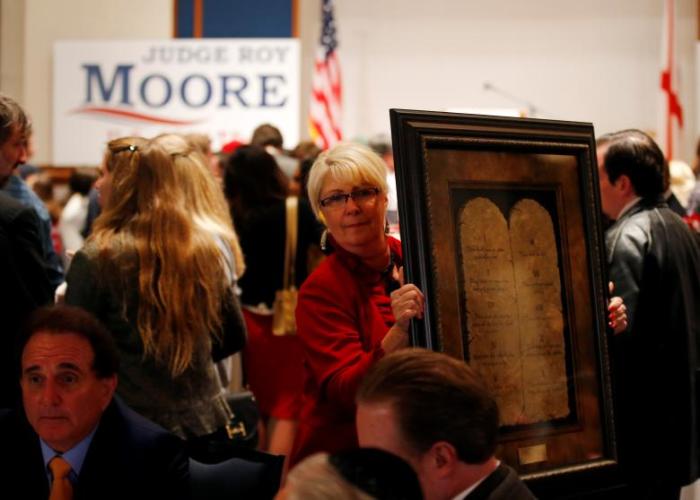Drop in Evangelical Turnout May Have Cost Roy Moore Alabama's Senate Race, Exit Polls Show

While much attention has been paid to the impact that African-Americans and women had in handing Democrat Doug Jones a victory over controversial Republican Roy Moore in Alabama's United States senate special election Tuesday, a drop in turnout among white evangelicals may have also helped Jones.
Although exit polls show that 80 percent of self-identified white evangelicals who voted cast their vote for the 70-year-old Moore, they also show that the turnout of that demographic dropped by a total of three percentage points in a race that the former Alabama Supreme Court chief justice lost by about 1.5 percentage points and just over 20,000 votes.
Early exit polling data show that self-identifying Alabama white evangelicals voted in a similar pattern that they did in the 2016 presidential election (exit polls show 81 percent of white evangelicals voted for Trump) but were less inclined to show up to vote for Moore — a Christian conservative facing multiple sexual misconduct accusations, including some involving women who were minors at the time — or a pro-choice Democratic nominee.
As Alabama has elected (barring a recount) its first Democratic senator since 1992, The Washington Post notes that white evangelical Christians comprised 44 percent of the exit poll results. By comparison, white evangelicals accounted for 47 percent of Alabama's voters in the 2012 and 2008 presidential elections, which were the last Alabama senate elections where exit polls were conducted. Given the total turnout was over 2 million in 2008 and 2012 and an estimated 1.3 million on Tuesday, about 350,000 to 400,000 more white evangelicals voted in 2008 and 2012 than on Tuesday.
While votes are still being counted, at press time Jones is leading Moore by 21,311 votes and there are 22,777 write-in ballots.
"[Moore] lost because so many evangelicals didn't show up," Albert Mohler, president of Southern Baptist Theological Seminary, was quoted as telling CNN anchor Don Lemon Wednesday morning. "That's the big story ... what didn't happen. You didn't have any major pastors or evangelical leaders [in Alabama], not a single one, willing to support Roy Moore."
"Given the percentage of evangelicals in Alabama, it's inconceivable that a candidate supported by them could lose," Mohler added. "They would not and could not vote for a pro-abortion candidate, and they would not and could not vote for Roy Moore."
Mohler also took to his radio program Wednesday morning to voice his thoughts on Moore's defeat, where he also credited Republican voters and female voters.
Exit polls show that Jones led Moore by a 17-percentage-point margin over Moore when it came to women voters — 58 percent for Jones and 41 percent for Moore. By comparison, Republican candidates enjoyed a 21-point advantage among women in the 2012 and 2008 Senate elections, according to ABC News.
Additionally, exit polls show that 21 percent of voters who said they were moderate Republicans voted for Jones and only 2 percent of voters who consider themselves moderate Democrats voted for Moore. Meanwhile, 23 percent of conservatives who identified as "somewhat conservative" voted for Jones, as opposed to the only 12 percent who say they are "somewhat liberal" and voted for Moore.
The polls also show that 97 percent of the voters who regarded the sexual assault allegations against Moore as "definitely true" voted for Jones, while 93 percent of the voters who regarded the allegations against Moore as "definitely false" voted for Moore.
"We now know that the allegations concerning sexual activity with young women including teenage girls had at least sufficient credibility to suppress the Republican vote in ways unprecedented in recent Alabama political history," Mohler said. "But we also know that there were at least a significant number of votes that were shifted from Republican to Democrat and there was a particularly interesting profile to many of those shifted votes."
On his program, Mohler underscored the importance of evangelical leaders not coming out in droves to back Moore during the campaign.
"One of the most crucial distinctions has to do with the presence of very prominent evangelicals in the Trump campaign in 2016 but the almost absolute absence of prominent evangelicals, especially from within the state of Alabama, in the 2017 Senate race," Mohler said. "This became particularly acute after the accusations of a sexual nature were made against Judge Moore. But it's very important to understand that we need to be honest and go back to the fact that there was not a single major evangelical leader or pastor in the state of Alabama who was publicly supporting Roy Moore in a very demonstrable way even prior to those accusations becoming public."
While a drop in evangelical turnout and a change in voting pattern among women and some Republicans might have had an impact in the election, it is important to note that other factors also played a role in the outcome, such as heavy turnout in areas of rural Alabama heavily populated by African-Americans called the "Black Belt," and heavy turnouts in counties that contain the state's four largest cities.
Polls show that 96 percent of black voters (who made up 29 percent of the exit poll results compared to 28 percent in the 2012 presidential election exit polls) voted for Jones, whereas only 68 percent of white voters (who accounted for 66 percent of the exit poll results compared to 68 percent in 2012 presidential election exit polls) voted for Moore.
According to The Washington Post, only 15 percent of white voters in Alabama voted for Democrat President Barack Obama in 2012 but 30 percent of white voters voted for Jones for Senate in 2017.





























